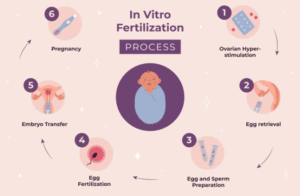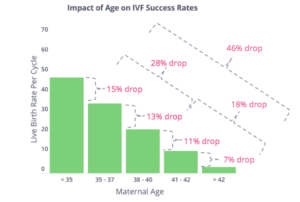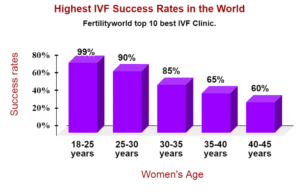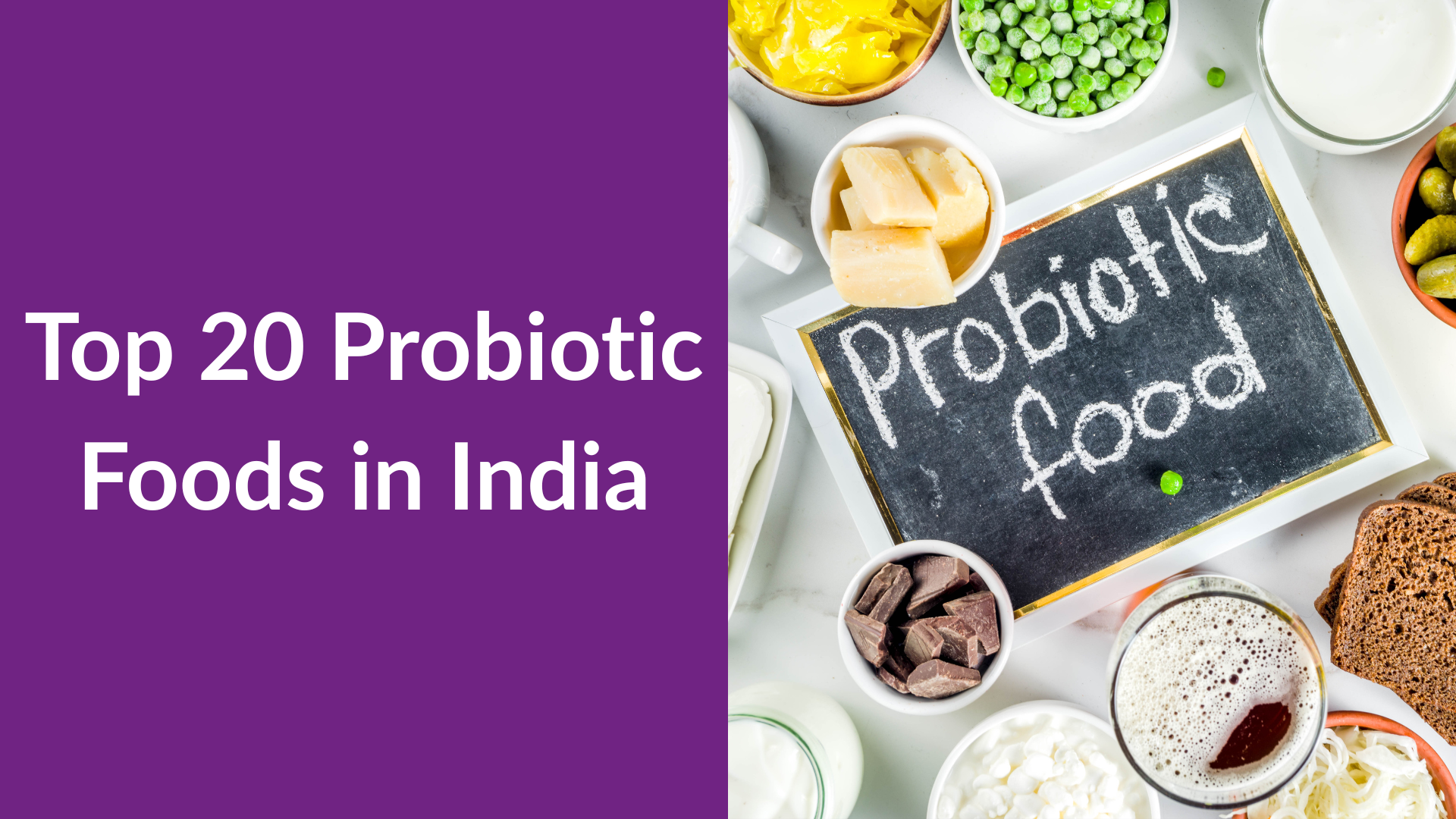Embarking on the journey of in vitro fertilization (IVF) can be both hopeful and overwhelming. Understanding the process, success rates, and factors influencing outcomes is crucial for individuals and couples considering this path to parenthood. This article aims to provide a comprehensive, yet accessible, overview of IVF, focusing on success rates by age and other pertinent factors.
What is IVF?
In vitro fertilization (IVF) is a form of assisted reproductive technology (ART) where an egg and sperm are combined outside the body in a laboratory setting. The resulting embryo is then transferred to the uterus with the hope of achieving a successful pregnancy. IVF is often pursued when other fertility treatments have not resulted in conception.
IVF Procedure & How Does it Work?


The IVF process involves several key steps:
Ovarian Stimulation: Fertility medications are administered to stimulate the ovaries to produce multiple eggs.
- Egg Retrieval: Once the eggs mature, they are collected from the ovaries using a minor surgical procedure.
- Fertilization: The retrieved eggs are combined with sperm in the laboratory to facilitate fertilization.
- Embryo Culture: Fertilized eggs (embryos) are monitored for a few days as they develop.
- Embryo Transfer: A selected embryo is transferred into the uterus.
- Pregnancy Test: Approximately two weeks after the embryo transfer, a blood test is conducted to determine if pregnancy has been achieved.
Who Can Have IVF?
IVF may be recommended for individuals or couples experiencing:
- Female Infertility: Due to conditions like blocked fallopian tubes, endometriosis, or ovulation disorders.
- Male Infertility: Such as low sperm count or motility.
- Unexplained Infertility: When no specific cause of infertility is identified.
- Genetic Disorders: To prevent passing on genetic conditions to offspring.
In Vitro Fertilization Success Rate by Age


Age plays a huge role in IVF. The younger the eggs, generally the higher the success rate. Let’s look at the real numbers.
IVF Success Rates Under 35 Years Old
For women under 35, the IVF success rate is the highest. The average IVF percentage success rate per cycle is around 32-35%, and that jumps if multiple embryos are transferred. Egg quality and quantity are often strong in this group, increasing the rate of success for IVF.
IVF Success Rates at 35-37 Years Old
This group sees success rates around 25% per cycle. While still good, this age is often considered a turning point in fertility. Doctors may recommend more personalized plans.
IVF Success Rates at 38-39 Years Old
At this stage, the average IVF success rate drops to about 19%. Egg quality begins to decline more noticeably, affecting both fertilization and implantation.
IVF Success Rates at 40-42 Years Old
Here, chances are roughly 11% per IVF cycle. While still possible, it may take more cycles or donor eggs to achieve success.
IVF Success Rates Over 42 Years Old
Success rates fall to about 4%. Many women in this age group turn to donor eggs, which can significantly raise their chances. It’s also when embryo grading and success rate data becomes even more important.
Why IVF Success Rates Change by Age?


Eggs age just like we do. After 35, eggs are more likely to have chromosomal issues, which can make fertilization or embryo development more difficult. The body also becomes less receptive to pregnancy over time.
Other Factors Influencing IVF Success Rates
Besides age, here’s what else can impact success:
| Factor | How it Affects IVF |
| Embryo Quality | High-grade embryos increase success chances. |
| Lifestyle | Smoking, alcohol, and stress can lower IVF success. |
| Weight | Both underweight and overweight can affect fertility. |
| Uterine Health | Conditions like fibroids may reduce implantation chances. |
| Sperm Health | Low count or poor motility affects fertilization. |
Ways to Increase IVF Success Rates
Here are a few tips to improve your odds:
- Eat Well & Move More: A healthy body supports a healthy pregnancy.
- Quit Smoking & Cut Alcohol: They can harm eggs and sperm.
- Stay Positive: Stress management matters. Try yoga, therapy, or journaling.
- Track & Time: Your fertility team will guide optimal timing.
- Consider Supplements: Folic acid, CoQ10, and prenatal vitamins can help.
Risks of IVF
While IVF is safe for most people, here are a few things to know:
- Ovarian Hyperstimulation: The meds can sometimes cause swollen ovaries.
- Multiple Pregnancies: IVF increases the chance of twins or triplets.
- Emotional Toll: IVF can be stressful, financially and emotionally.
- Failed Cycles: Sometimes, even when everything goes right, IVF doesn’t work.
Conclusion
Understanding the in vitro fertilization success rate by age helps you make more informed decisions about your fertility journey. While age matters, so do hope, health, and having the right team by your side. You’re not alone in this—and every story is unique.
FAQ – IVF Success Rates By Age


What age is IVF most successful?
IVF is most successful for women under the age of 35. At this age, egg quality and quantity are at their peak, increasing the chances of fertilization and healthy embryo development. Many clinics report a success rate of 32-35% per cycle for this age group, making it the ideal time.
Does IVF have a 100% success rate?
No, IVF does not have a 100% success rate. While it offers hope to many, several factors like age, egg and sperm quality, and overall health influence outcomes. Even under optimal conditions, there’s no guarantee of pregnancy, and multiple cycles are often needed. Managing expectations is important during the journey.
Is 2 eggs enough for IVF?
Two eggs may be enough for IVF, especially if both are mature and of good quality. However, having more eggs increases the chances of producing healthy embryos. Success also depends on how well the eggs fertilize and develop. Quality often matters more than quantity in achieving a viable pregnancy.
When do most IVF fail?
Most IVF failures happen in the early stages—during fertilization, embryo development, or implantation. Poor egg or sperm quality, chromosomal abnormalities, or uterine issues can contribute. Even if embryos are transferred, they might not implant. That’s why monitoring and embryo grading play a key role in identifying viable options.
When to stop IVF?
Deciding when to stop IVF is a personal and emotional choice. Many couples try three to four cycles before reconsidering. Factors like age, emotional well-being, financial limits, and medical advice often influence the decision. Some explore alternatives like donor eggs, surrogacy, or adoption when IVF repeatedly proves unsuccessful.




